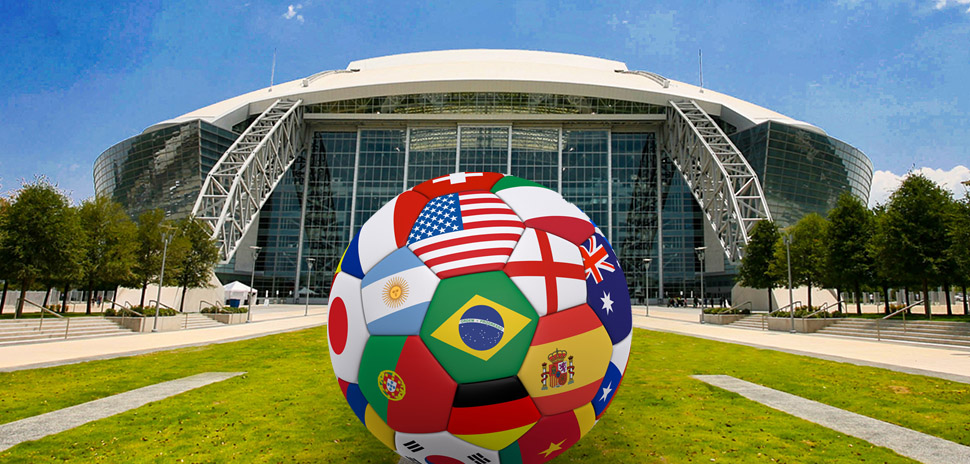When an interest creates a strong bond within your family, it becomes something you hold dear. For my family, soccer was that cherished connection. My parents put my brother and I into soccer when we were young; we played it for many years until we learned of new passions. Even if we did not play anymore, it was something that we all still really enjoyed. Every weekend, as one, my family would watch the Premier League, an English soccer league. In classic fashion, half of us rooted for Manchester City and the other half for Liverpool (those are great rivals in the soccer world). Over the years, we even had the chance to travel to England to see these teams compete. Traveling to see your favorite players was special, so when I heard that the greatest soccer tournament of all time, the FIFA World Cup, was coming to New York/New Jersey, my home, I jumped with excitement at the possibility of attending!
Liverpool vs. Chelsea in the Carabao Cup Final at Wembley Stadium, London (Picture taken by me in Feb 2024)
The game will be held in June/July 2026 at Metlife Stadium in East Rutherford, New Jersey, soon to be named New York/New Jersey Stadium, for political reasons. Only a few of the actual games will be held in New Jersey, making the fight for tickets, housing, and more, intenser than I initially imagined. I immediately started investigating the likelihood of my family getting the chance to attend this glorious event. I wondered if New York and New Jersey could handle the capacity of avid soccer fans willing to travel to attend the World Cup. Will transportation to and from the arena run smoothly? Will the increased usage of rental cars and Ubers/taxis increase congestion and air pollution? Wouldn’t congestion pricing then become ever more necessary to implement if the number of vehicles and congestion increases in the city? Can we do this sustainably? How will New York and New Jersey prepare for something of this magnitude?
The questions just kept rolling, so using my newfound position in the transportation world, I looked to the experts for some perspective on how something so significant could be done in the best way possible. My colleague Laura, who runs Tri-State’s communications, connected me to the Regional Planning Association (RPA), a non-profit organization that, like TSTC, focuses on improving the quality of life as it relates to transit for the region. They conduct research regarding the environment, land use, transportation, communities, and public agencies to improve economic health, environmental resilience, and equity. RPA made a recent effort to address some of my concerns about the soccer game, similarly asking how we can successfully handle the FIFA World Cup and what we can do to prepare for it. On June 25th, 2024, they hosted “Penalties and Goals: Best Practices and Pitfalls from FIFA World Cup Host Regions” with a group of panelists, made up of different professionals from all over the world who have hosted World Cups and Olympics in hopes they could bring different perspectives and advice as it relates to planning, coordination, the economy, transportation, tourism, and housing. The panelists included Beatriz Garcia (Member, Culture & Olympic Heritage Commission, International Olympic Committee), Greg Clark (Co-founder, of The Business of Cities, and Chair of the Connected Places Catapult (CPC) in the United Kingdom), Aj Colleti (Executive Leadership Team, Arcadis), Sara Candiracci (Associate Director, Cities, Planning and Design team in Milan, and the Global Leader for Social Value and Equity, Arup), and Nic Merridew (Director, Host Cities Team, Arup). Zoe Baldwin (Vice President, State Programs & New Jersey Director) from RPA served as the moderator.
Regional Planning Association: “Penalties and Goals: Best Practices and Pitfalls from FIFA World Cup Host Regions”
Although there are many topics to be addressed as relevant to the success of the tournament, the main issue that the panel went over was transportation. The panel discussed how New York and New Jersey already have great transit networks but emphasized how significantly they could improve. Many of the panelists argued that holding an event of this magnitude might be the saving grace for the region’s transportation systems if planned well. Panelist Sara Candiracci asked her fellow experts, “How can we retrofit the existing infrastructure to become more sustainable and successful in the long run?” Some upgrades that were suggested included: updating aged infrastructure, increasing the frequencies of buses, trains, and ferries, promoting the use of e-bikes or bike-sharing systems, putting in place more air conditioning and heating capabilities, having electric shuttle buses transport visitors, and adding more MTA, Port Authority, Metro North, or Amtrak workers so that riders can ask questions and feel safer while commuting. All of these improvements should be done regardless of whether or not a major tournament is going on. New Yorkers and New Jerseyans deserve faster, more reliable, and more comfortable transportation. All of the upgrades mentioned above are integral to making the system great, but a specific upgrade that, to me, is integral is increasing frequencies of buses and trains. As someone who often misses the subway, having more that are quickly right behind would help me control and improve my daily life.
One of the more fascinating improvements that the panel discussed was implementing an integrated ticketing system. A merger of this kind would allow riders to complete a trip involving multiple transfers within or between different transportation methods with a single ticket that is valid for the entirety of the experience. Transportation methods include buses, trains, subways, ferries, and more. Some examples of successful integrated ticketing systems include: the Netherlands system called “OV-chipkaart,” Paris’ system called “Navigo pass,” Switzerland’s system called “Swiss Pass,” etc. This is an essential system because it allows for a lot more smoothness while traveling. This would do wonders for traveling to a major tournament because there is not one way to arrive at a destination unless everyone is coming from the same place. Even just commuting on a typical day to and from work could greatly benefit from having a way to transfer between different modes of transportation without having to pay for each separate ticket. Take a commuter from the Bronx. The closest subway station might be two blocks away up a very steep hill. To get to the station, the rider would have to take a bus to the subway unless they want to heave it up the giant hill. Imagine a system where you can pay for the whole journey, bus to subway, in one method instead of having to pay two separate times. Not only would this lessen a financial burden, but it would also stop commuters or riders from only paying for one mode of transportation and evading the fare on another. New York and New Jersey would greatly benefit from an integrated ticketing system; it would save money for commuters, and it would provide ease and comfort while commuting.
Since the integrated ticketing system is not in place and there is not always a smooth way to get to and from something like a major tournament, people might have the idea that taking public transit to a major tournament is going to be hellish, hot, and a packed journey. Hence, they choose to ride in a car there instead. Hiring a car service or driving oneself to the game will prove itself as an impractical way of transportation. Since companies like Uber or Lyft will notice the increased demand, their prices will go up, making transportation to the event unaffordable. Drivers will complain of limited parking. There is also the moral dilemma of traveling by car since the increased number of cars in an already car-centric place might lead to significant environmental repercussions. Around 70,000 fans frequented the World Cup in Qatar daily, so I’m assuming New York and New Jersey can expect around the same or more amount of people commuting to the stadium. The most efficient way to transport around that amount of people to the World Cup would be through public transportation. Still, if the systems in place are incompatible with the volume of travelers, the system will clearly fail them.
The panelists proposed “providing some incentives and discounted rates for people” to travel via public transit. Still, my mind went to a place where commuting and traveling using public transportation could be free. I wondered if New York and New Jersey could run free transit to the World Cup. I found my way to an interview done by NJ Spotlight News with a reporter named Katie Sobko, who received an exclusive on the tournament contract. FIFA contacted New York and New Jersey officials about hosting the tournament and asked for a lot to ensure success. One of the main requests they had was for free transportation to be offered (“New Details of NJ’s World Cup Contract”). Free transportation for all attendees, or at the least a discounted rate, would ensure that all could easily access the stadium. Travelers are expected from all over the state and globe to come watch the matches. If you were to add up the ticket prices along with the difficult-to-navigate transportation costs, that would be a large financial burden on people who just want to enjoy a wonderful sport. The opportunity to minimize expenses by subsidizing or even making transit free offers many soccer fans and families an opportunity to attend and create lasting memories.
Unfortunately, state officials from New York and New Jersey shut that idea down immediately because the current transit systems rely heavily on users for funds. If a rider does not pay, the money allocated to improving the systems diminishes– or so they say. Shifting to a transportation system that allows riders to ride without cost will inevitably make transit more accessible. However, the panel and regional lawmakers weren’t optimistic that it would be possible by 2026. In the meantime, the panelists suggest improvements to increase rider capacity and cooling and repair poorly conditioned cars over the next two years. With Congestion Pricing indefinitely delayed, there is a fear that financing these enhancements will take even longer than two years.
Lastly, the panelists were very concerned about the legacy left over from hosting. Panelist Greg Clark said, “We have to come to think about a legacy as how a global event like this induces some kind of long-term change…the legacy has to be deliberate.” Each World Cup Host has a chance to do something remarkable. They can create real, lasting changes in their cities that can push them towards a more sustainable future. That is why, to me, this World Cup is the perfect opportunity to make all the changes necessary to create a better transportation system. Some of these changes include some already mentioned, such as increasing rider capacity, cooling and repairing poorly conditioned cars, adding an integrated ticketing system, and ultimately making the shift towards free transportation. Panelist Beatriz Garcia said, “Even if you cannot resolve everything on time for 2026, you might be able to start processes that might be ready for the year after.” Suppose we start the movement towards free and accessible transportation now. In that case, we will eventually become one of the few cities in the world, alongside Luxemburg and Kansas City, to offer free transportation. This could be a remarkable win for New Yorkers and New Jerseyans. It could make transit accessible and it could improve the lives of many by reducing such a large financial burden.
I hope that my family and I get the opportunity to go to the games in 2026. I hope that the movement towards an innovative transportation system is in the process. And I hope that New York and New Jersey have the potential to become sustainable cities that we can be proud to represent.
Sources:
(2)

